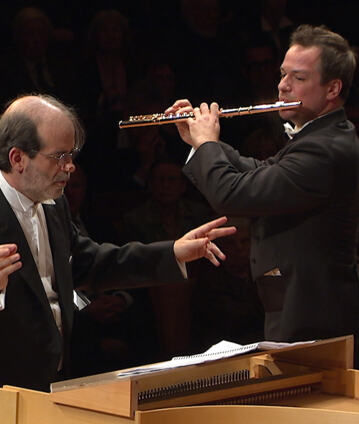A Vivaldi evening with Andrea Marcon and soloists of the Berliner Philharmoniker

The music of Antonio Vivaldi is full of Venetian magic – spirited and charming, but also virtuoso and innovative. Andrea Macon is one of the most renowned interpreters of Vivaldi, and here devotes an entire concert to his music – with many members from the Berliner Philharmoniker at his side as soloists. The concert closes with Vivaldi’s brilliant Gloria, one of the most exhilarating sacred choral works there is.
Even during his lifetime, Antonio Vivaldi, who refined Arcangelo Corelli’s concerto grosso with a palette of colours never before known to the “concerto con molti stromenti”, was acclaimed in Italy as a virtuoso, an experimental composer and a successful opera entrepreneur. An excellent opportunity to make his creative work known outside of the country came about in 1716, when Prince Elector Frederick August II of Saxony visited Venice together with several musicians from his Dresden court orchestra.
The orchestra was famous throughout Europe, and its concertmaster Johann Georg Pisendel became Vivaldi’s pupil and friend. He would later disseminate his music around the world via the Dresden “hub” – works such as the Concerto for solo violin, solo violoncello, two oboes, two horns, bassoon, strings and basso continuo RV 569 and the Concerto in G minor for solo violin, solo oboe, two recorders, two oboes, bassoon, strings and basso continuo RV 576, which originated exclusively for the Dresden ensemble of virtuosi.
That Vivaldi not only broke new ground with more fully scored solo concerti became known only at the end of the 1930’s when an extensive collection of vocal works was rediscovered that by that time had been completely forgotten. The Gloria in D major was probably the most significant sacred choral work of the Venetian master – a brilliant composition with alto and soprano soli, composed for a performance at Vivaldi’s sphere of activity for many years, the Ospedale della Pietà.
With these concerts, the Berliner Philharmoniker prove yet again in this season that historically informed practice has long since found its way into modern symphony orchestras; for this, they have invited the Italian baroque specialist Andrea Marcon to conduct them.
© 2012 Berlin Phil Media GmbH
Related interviews
Artists
Our recommendations
- Family concert: “Jingle Bass Rock”
- Janine Jansen plays Tchaikovsky’s Violin Concerto
- Yutaka Sado conducts Shostakovitch and Takemitsu
- Season opening 2015: Simon Rattle conducts Britten and Shostakovich
- Andris Nelsons conducts Mozart, Wagner and Shostakovich
- Karajan conducts the 1978 New Year’s Eve Concert